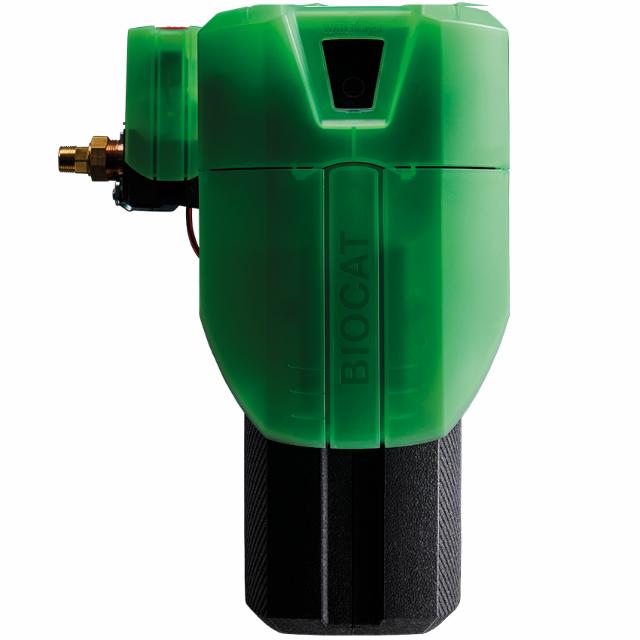
FUTURE LIMESCALE PROTECTION FOR YOUR HOUSEHOLD

Many Danish households suffer from drinking water in the area that contains high levels of calcium, which we call "hard water." High calcium content in the water can lead to clogged pipes, frequent repairs of household appliances, extra cleaning, and higher heating bills. Therefore, if you have hard water in your taps, it can be a really good idea to protect your home from limescale.
Many benefits of effective limescale protection
With a BIOCAT lime protection system, you maintain the energy efficiency of your home's heat exchangers, water systems, and household appliances. This reduces energy consumption, heating bills, and CO2 emissions significantly. At the same time, your home's installations, appliances, and white goods last longer. Since you don't have to add salt to the system, your drinking water also maintains its good, natural taste and all the minerals that are important for your family's health. BIOCAT is German quality and easy to install for your plumber. The systems are suitable for all water hardness levels and require no maintenance for five years, after which the granules are replaced.
Nature's limescale protection
The system works by biomineralization, which is nature's own method. The water is led into the system and flows over granules that change the properties of the calcium, making it problem-free. In the water system, the water still contains natural calcium, now in a form that doesn't cause calcium issues in pipes, heating systems, etc. Surfaces in your kitchen and bathroom also become easier to clean. With biomineralization, you don't pollute the water environment with salt and phosphates, and you save nature from harsh cleaning agents.
Why it's important to protect your home from limescale deposits

Environmental impact:
Improved energy efficiency resulting from lime protection contributes to a reduction in overall energy consumption. This is not only cost-effective for households but also has positive environmental consequences by reducing the CO2 footprint associated with energy production.

Energy efficiency:
Limescale deposits in heating elements can insulate them and reduce their efficiency. This means that appliances like water heaters and boilers need more energy to heat water, leading to increased energy consumption, higher electricity bills, and an increased CO2 footprint. Protecting against limescale helps maintain optimal energy efficiency and reduce environmental impact.
Reduced maintenance costs:
Appliances affected by limescale may require more frequent maintenance and repairs. Protection against limescale can reduce the need for such interventions, saving homeowners both time and money.
Appliance performance and lifespan:
Appliances such as coffee makers, irons, and humidifiers can be negatively impacted by limescale deposits. An effective lime protection system helps maintain optimal performance for these appliances and extends their lifespan.

Improved cleaning results:
Dishwashers and washing machines may experience reduced efficiency due to limescale deposits. Effective lime protection ensures that these appliances can function optimally, providing better cleaning results for dishes and laundry.
Drinking water hygiene:
Limescale deposits in pipes and hot water tanks cause microorganisms to settle, multiply, and form a strong biofilm. This creates favorable conditions for bacteria such as legionella. Also for hygienic reasons, it is important to minimize limescale deposits.
KLS SERIES
Effective lime protection with leak detection
The BIOCAT KLS series consists of state-of-the-art, chemical-free lime protection solutions with digital leak detection, smart control/app, and an optimized mounting system. The KLS systems are a further development of the KS systems and are suitable for 1 to 3 residential units.
Extra security for homeowners
The systems combine effective lime protection with 24/7 prevention of water damage, providing homeowners with extended security. The accompanying BIOCAT app and digital data collection help control water consumption and reduce it if necessary.
BIOCAT KLS 3000-C and KLS 4000-C are also characterized by:
- Protection function in offline mode via acoustic warning signal and message on the display.
- Intuitive operation and maintenance/change of granules via the BIOCAT app
- Option for both vertical and horizontal mounting, regardless of flow direction
Both KLS 3000-C and KLS 4000-C are DVGW certified for hygiene and documented lime protection effect.
KS SERIES
Chemical-free lime protection for single and multi-family homes
The KS series provides reliable protection for the entire drinking water installation and is suitable for everything from single-family homes up to 17 units. The systems are easy to integrate and, aside from replacing granules every five years, require no maintenance or system support.
Reliable and with low operating costs
The systems are characterized by very low operating costs and extremely reliable operation. Self-thermal disinfection without chemicals ensures optimal drinking water hygiene. The KS series is also excellent for operating solar collectors and/or plate heat exchangers.
BIOCAT KS 3000 to KS 8000-C are also characterized by:
- Safety in case of power failure thanks to the automatic FailSafe module
- Easy maintenance and control via connection to building management system (BMS)
- No need for service and system support from internal technicians or staff
These systems in the KS series are additionally DSWG certified for hygiene and documented lime protection effect:
LS 25-C, KLS 3000-C, KLS 4000-C, KS 3000, KS 4000, KS 3000-C, KS 4000-C, KS 5000-C, KS 5500-C, KS 6500-C, KS 7000-C, KS 7500-C, KS 8000-C, KS 11000, KS 14000, KS 3,5D, KS 5D









.png&width=640&format=webp)






